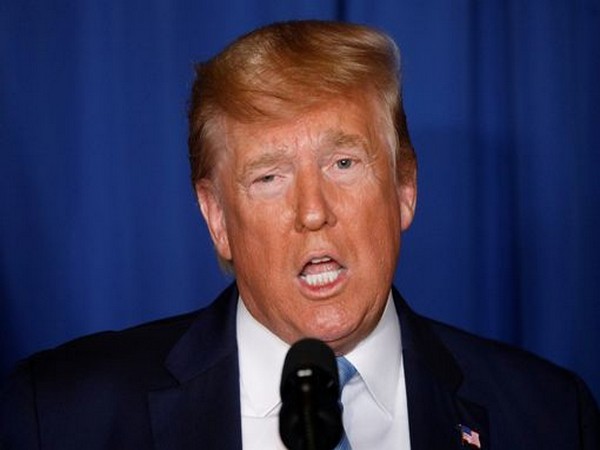EXPLAINER-Inside the plans for Trump's expanded travel ban

U.S. President Donald Trump said he plans to expand his travel ban to bar people from several additional countries, a move that could again reignite questions about whether the policy discriminates against Muslims. Trump said during a visit to Davos, Switzerland, last week that his administration planned to add "a couple of countries" to the ban, but did not give further details.
According to a source familiar with a draft version, the tentative list of nations included Belarus, Eritrea, Kyrgyzstan, Myanmar, Nigeria, Sudan and Tanzania. WHY IS TRUMP ISSUING A NEW BAN NOW?
Trump is seeking re-election in November and has made immigration restrictions a central focus of his 2020 campaign. The revised ban could appeal to Republican voters and Trump's stance will contrast with the current crop of Democratic candidates. A survey by Politico-Morning Consult released on Wednesday found that 73 percent of Republican voters backed the policy.
The announcement of the ban's expansion is expected to come as soon as this week, according to a Department of Homeland Security (DHS) official who requested anonymity to discuss the process. The timing is close to the third anniversary of its original release, which occurred within days of Trump's January 2017 inauguration. The travel ban went through three iterations, all which were challenged in federal court. The current version — issued as a presidential proclamation in September 2017 — requires the DHS to review the visa restrictions every 180 days and permits the addition or removal of countries. The ban was upheld by the U.S. Supreme Court in June 2018 and includes a periodic review of whether countries should be added or taken off the list.
WHY INCLUDE THESE SEVEN COUNTRIES? The Trump administration has not publicly announced the countries under consideration for the expanded travel ban, nor given reasoning for targeting specific nations. But Reuters confirmed that the administration has weighed visa restrictions against Belarus, Eritrea, Kyrgyzstan, Myanmar, Nigeria, Sudan and Tanzania, a list first reported by Politico.
The country list could change before Trump issues the new ban, the DHS official said. The U.S. State Department declined to comment, while the DHS and the White House did not respond to requests for comment. Margaret Huang, executive director of Amnesty International USA, suggested during a call with reporters on Tuesday that barring countries such as Myanmar and Eritrea, where the organization has documented human rights violations, could make it more difficult for migrants seeking safety in the United States.
Several of the countries on the possible target list, such as Nigeria and Tanzania, have strong economic and security-related ties to the United States. In 2017, Trump reportedly complained that Nigerian immigrants coming to the United States would never "go back to their huts" in Africa, according to a New York Times report that year. The White House denied at the time that Trump referenced "huts" in the discussion.
Nigeria received no warning from Washington that it could be subjected to the new ban, a Nigerian government minister said on Monday. HOW DID THE TRUMP ADMINISTRATION EVALUATE COUNTRIES?
As directed by the current ban, the DHS completed a worldwide review of countries last year that evaluated whether the entry of their nationals into the United States could cause a public safety threat, according to the DHS official and a second department official. The review examined each country's ability to verify the identity of its own nationals, information sharing practices with the United States, and possible terror or public safety risks, the officials said.
State Department officials then attempted to work with the countries to remedy outstanding issues, a step that removed some countries from consideration, according to the officials. Ultimately, Trump will decide the countries that will be subjected to the visa restrictions, the officials said.
WHO WILL BE BANNED? The updated travel ban will be tailored and not outright bar all travelers from the countries, according to the two DHS officials.
Instead, the countries will be subjected to a range of visa restrictions with a focus on immigrant visas, according to one of the officials. Such visas - unlike a visitor visa - can lead to permanent residency. Since it's implementation in December 2017, at least 79,769 visa applications have been subject to the ban, according to date from the State Department. Of those, 6,333 qualified for exceptions and another 17,798 were granted waivers, but a federal lawsuit claims the waiver process is opaque and difficult to navigate.
IS THE TRAVEL BAN DISCRIMINATORY? During Trump's presidential campaign in 2015, he called for "a total and complete shutdown of Muslims entering the United States."
After he issued the first version of his travel ban, critics derided the order — which targeted travelers and immigrants from seven Muslim-majority nations — as a "Muslim ban." Three of the nations under consideration for the updated ban — Kyrgyzstan, Nigeria and Sudan — have majority Muslim populations. Eritrea and Tanzania have sizable Muslim minorities.
The list of countries currently subject to visa restrictions include five Muslim-majority nations — Iran, Libya, Somalia, Syria and Yemen. North Korea and Venezuela also faced visa restrictions, but those measures affect relatively few travelers. Litigation over the ban is continuing.
(This story has not been edited by Devdiscourse staff and is auto-generated from a syndicated feed.)
ALSO READ
Somalia sends away Ethiopian ambassador over port deal - officials
Somalia sends home Ethiopian ambassador over port deal - officials
UN commited to support Somalia in protecting lives of civilians from explosive hazards
Somalia sends Ethiopian ambassador home for consultations, closes consulates
"Noted with concern": MEA on attack against Iranian diplomatic premises in Syria










